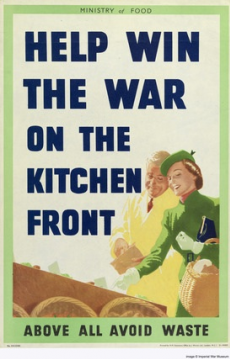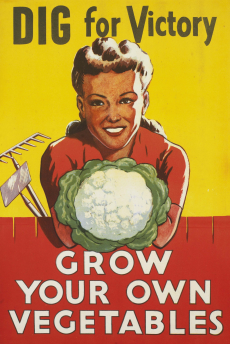
Today the Western world is often accused of having an obesity problem but in the Second World War the people of Britain were very restricted in what they could eat. The emergence of war hindered many trade routes and because of a national food shortage the government declared a state of food rationing in January 1940. Each man, woman and child was provided with a rationing book and coupons which entitled them to the food in specific measurements and simple foods that we now take for granted such as butter, sugar, meats and cheeses were all strictly rationed. As the war progressed and food began to run more scarce there were often long queues for basic foods. Some less perishable foods such as biscuits and tinned food were rationed using a points system instead and were prioritised based on their availability at the time. Also some people such as children and pregnant women were given priority for such items as cheese, milk and eggs containing calcium to help them grow and stay healthy. It was a well organised system considering the mass panic it could have become and is a credit to both the Ministry of Food and the people of Britain in the 1940s.
It wasn't only food that was rationed. Petrol was rationed in 1939, clothes in 1941 and even soap in 1942! Also the rationing did not simply stop when the war ended in 1945 as there was a shortage of resources, economy and manpower worldwide, especially in Europe, and it would take some years even with great help from competing post war superpowers America and Russia to repair the state of some countries. Bread for example was rationed in Britain in 1946 and meat was still rationed until the mid 1950s! Of course not everyone was so loyal to the war effort and there were ways around the rationing. Several shop keepers would keep some stock behind that had been obtained often by suspicious means and would then sell it for some extra money in secret on the black market. Several petty criminals known as 'spivs' would sell all kinds of rationed items on the black market and not just food. Many were caught and prosecuted for letting down their country in a time when they all had to unite but nevertheless the black market thrived in 1940's Britain.

There were some more honest ways of getting extra food however. Growing your own was a sure method of producing food that wasn't rationed and was all yours and for many people who lived in the countryside it was a more comfortable time than for city dwellers. In fact growing your own food was encouraged and the campaign title became known as 'Dig for Victory'. My grandad was evacuated from near London to go live in the countryside with his Aunt and Uncle during the war in order to escape the bombing like so many children were but he benefitted from it greatly! Most evacuees were sent to random stranger's houses in the country that were obliged to look after them, though many volunteered. However for my grandad he was lucky enough to have family in the country and further to this, his aunt and uncle owned a farm so they always had some extra dairy products and meat than he had eaten living near London. Of course they had to sell much of the meat and produce from their animals but they were entitled to keep a little for themselves which worked out at more than the average Londoner was entitled to by rations.
However, overall the Government kept the ration system working effectively and because there was an excess of carrots and potatoes they created the cartoon characters of Doctor Carrot and Potato Pete to encourage families and particularly children to eat them. Ever wondered why people say carrots make you see in the dark? Well one poster stated that carrots increased the ability of pilots to see enemy planes at night (though in reality the invention of Radar did this job far better than eyesight). Food was certainly not wasted and posters saying things such as 'wasted food is a wasted ship' reminded people that their every action effected their nation and the possible outcome of the war. The unity of Britain for the most part throughout the Second World War was remarkable and is reflected largely through the overall success of the rationing scheme.
IMAGE 1: http://www.recipespastandpresent.org.uk/recipes/images/winwar.jpg - A poster encouraging people to aid the war effort by minimising food waste, only eating what was needed.
IMAGE 2: http://molhoingles.com/wp-content/uploads/2012/09/dig-for-victory-grow-your-own.jpg - A poster from the 'Dig for Victory' campaign.

0 Comment:
Be the first one to comment on this article.